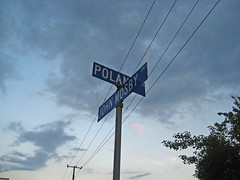 Image by gibranparvez via Flickr
Image by gibranparvez via FlickrThe Belgian Refugee Council (CBAR – BCHV) have published a report highlighting that Poland does not always grant refugee status, even when it should, because of a very strict interpretation or sometimes misinterpretation of the refugee definition. The interpretation applied by the Polish authorities is often not in line with UNHCR guidelines, UNHCR handbook and the jurisprudence of the European Court of Human Rights (ECtHR).
The majority of all asylum applications in Poland come from Russian nationals (80%), mainly Chechens, followed by Georgia (11%), Armenia (1%), Belarus (1%), Ukraine (1%) and other nationalities (6 %). In 2010, Belgium received on average 58 asylum seekers every month who had entered the EU through Poland. According to Eurostat figures, in 2010, Belgium requested Poland under the Dublin system to examine 1,254 asylum applications. France asked Poland to assume responsibility for 1,302 people. Germany, Austria, the Netherlands and Switzerland did the same for 1,124, 818, 748 and 307 people respectively.
On the positive side, in addition to refugee status and subsidiary protection, Poland can also grant 'tolerated stay permits' for an indefinite period of time, based on articles 2 (right to life), 3 (prohibition of torture), 4 (prohibition of slavery and forced labour), 5 (right to liberty and security), 6 (right to fair trial) or 8 (right to family life) of the European Convention on Human Rights and the UN Convention on the Rights of the Child.
The report is based on a mission to Poland in September 2010 under the direction of MEP Bart Staes, aiming to assess the situation of asylum seekers in Poland particularly in the context of those who have been sent back to Poland from Belgium under the Dublin Regulation. In 2010, only 14.6% of the 6,500 applicants who sought asylum in Poland were granted international protection.
In January, a ruling by the ECtHR put into question the assumption upon which the Dublin system is based, that is, that all EU Member States respect fundamental rights and that is therefore safe to automatically transfer asylum seekers between EU countries.
Poland's foreign minister returned from a trip to Tunisia 17 May with 16 Christian refugees who had found their lives upturned by turmoil in North Africa.
Poland described the move as a gesture of symbolic support for Christians in Africa and as an act of solidarity with Tunisia, which has been overwhelmed by refugees fleeing the violence in neighboring Libya.
"Poland looks after the rights of Christians in the world. This is our gesture of solidarity with persecuted Christians," Foreign Minister Radek Sikorski told the refugees as they prepared to board the plane to Poland a day earlier.
One analyst described the move as a clear call to the rest of Europe to take in more refugees and have more open borders. Marcin Zaborowski, director of the Polish Institute of International Affairs, said that Poland believes "Europe should be more open" and that the government is urging greater openness as it prepares to take over the rotating presidency of the European Union on July 1.
The Foreign Ministry described the six adults and 10 children as political refugees from Eritrea and Nigeria who had been in refugee camps in Libya until they fled the civil war there to Tunisia.








 Join our page
Join our page


How did you cook up that title is beyond me.
ReplyDeleteEcre headed their article "refugees left without protection" - the actions of the Polish Foreign Minister led me to add the rest. Those actions speak for themselves.
ReplyDelete